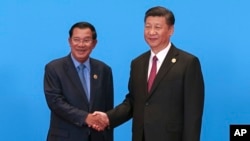Contrary to the Chinese government’s public support for the crackdown on political opposition in Cambodia, Chinese state media on Sunday published commentary warning of the potential impact of repression on Cambodia’s “hard-won” economic growth.
In an article published by the Global Times’s Hu Weija warned of the risks of the crackdown on political opponents and civil society would have to the “popular destination for Chinese investors.”
The article came just days after Beijing held a historic party conference. It also warned of the risks of prolonged strains on relations between Washington and Phnom Penh, adding that the possibility of sanctions “cannot be ruled out”.
“Political stability is a necessity for a nation to prosper and develop, especially a country like Cambodia, whose economy has traditionally been supported by tourism and garment exports,” Hu wrote. “Letting the situation in Cambodian deteriorate would scare off foreign tourists and investors and deal a heavy blow to the local economy.”
The U.S. and E.U. comprised some 60 percent of Cambodia’s exports in 2016, leading many analysts to warn that economic sanctions against Phnom Penh from the west could have a major impact despite its increasing closeness with China.
China is the main investor in Cambodia’s garment sector, which produces a large proportion of the exports destined for Europe and North America.
Sweden last week joined other western states in warning that it may revise its relations with Phnom Penh if the government does not change course.
In September, Prime Minister Hun Sen’s government arrested the opposition leader, Kem Sokha, who now faces treason charges widely seen as politically motivated, while numerous civil society groups and independent media outlets have also been targeted.
“Criticism from Western countries may cast shadows over Cambodia's economic future,” the Global Times reporter wrote, saying there is a need for “appropriate solutions” to deescalate the tension to ensure stability.
“As an important economic partner of Cambodia, China will pay close attention to the situation in the Southeast Asian country and willingly provide the necessary help,” it added.
On Sunday, Hun Sen said the dissolution of the Cambodia National Rescue Party was “inevitable”, urging opposition MPs and local officials to defect to his ruling Cambodian People’s Party.
For his critics, Hun Sen’s pivot to China over recent years is partly to blame for the rising tensions ahead of next year’s general election. Following Kem Sokha’s arrest, Wang Jiarui, a senior Communist Party envoy, reportedly pledged China’s support for the crackdown.
Em Sovannara, a Phnom Penh-based analyst, said that despite China’s support for the crackdown, it was not an insignificant sign that a critical article had appeared in state media.
“It is not totally reflective [of China’s position] but it must mean something about China’s stance,” he said.
A foreign ministry spokesman could not be reached.
In July, the International Monetary Fund warned that the Cambodian economy could suffer from “election-related uncertainties”, pointing to the decline in investment in the first half of 2017.
But Sok Eysan, ruling CPP spokesman, said China’s stance on current Cambodian government policy was unchanged and that there had been “no backdoor whispers” to the contrary.
“That is the official stance of the Chinese state,” he said, referring to Jiarui’s comments.
“Not everything journalists say is right. That is merely the expression of their opinions. We are thankful that they are worried about the situation in Cambodia,” he added.
Chheang Vannarith, a visiting fellow at the ISEAS-Yusof Ishak Institute in Singapore, however, said Chinese companies were likely to be worst hit by any economic downturn resulting from the crackdown.
“China is concerned over Cambodia’s political instability,” he said. “However, China firmly adheres to the non-interference principle. China will continue to support Cambodia in any circumstances.”







